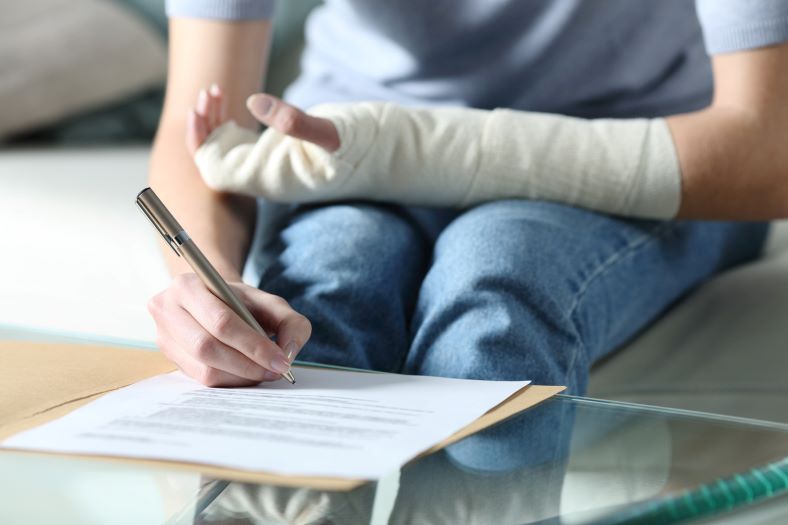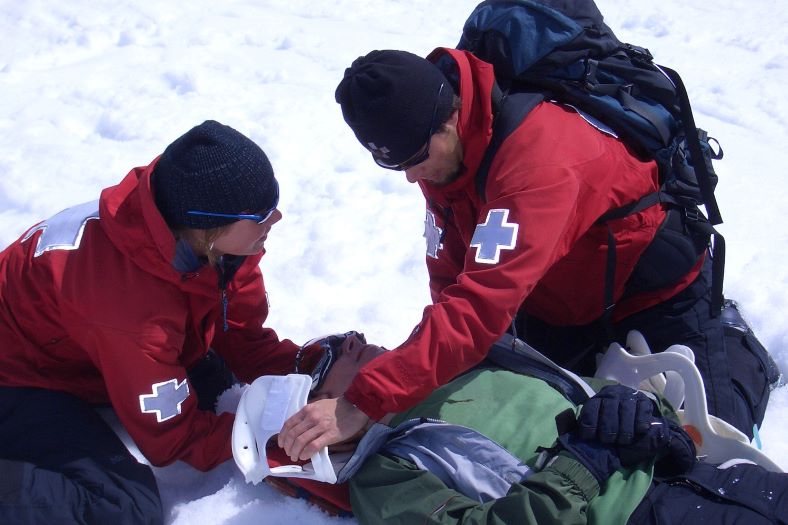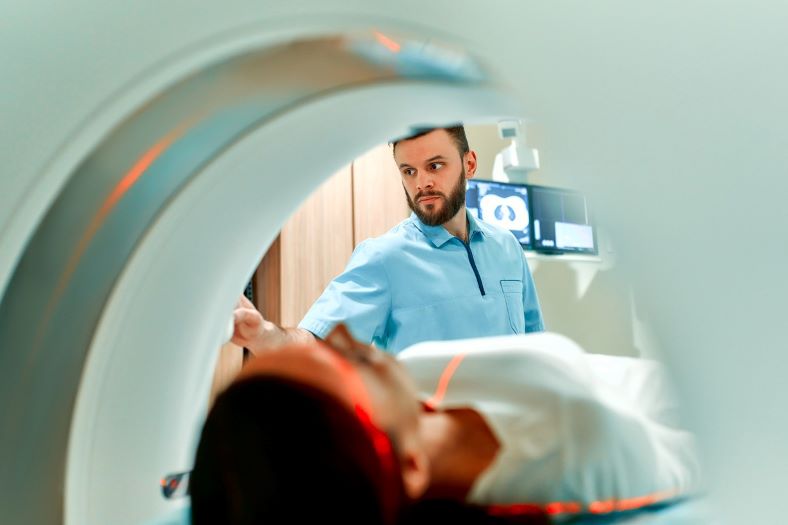What Is Traumatic Brain Injury?
Traumatic brain injury (TBI) is trauma to the brain that interferes with normal functioning. When an individual suffers a blow or jolt to the head, it may interfere with normal activity in the brain with or without a loss of consciousness. Our traumatic brain injury attorneys share what you need to know about suffering a TBI after an accident.

Traumatic Brain Injury Definition
Trauma to the brain can occur in multiple ways. A blow from a blunt object can result in a skull fracture or piercing of the brain. The effects may be trauma and abnormal brain functioning.
In addition, head injuries can occur in the form of a jolt or shaking of the brain without any penetration. This shaking of the brain can be extremely harmful causing a loss of consciousness and long-term effects.
What Causes Traumatic Brain Injury?
Traumatic brain injury may have several causes, including:
- Car accidents
- Motorcycle, truck, bicycle, and pedestrian accidents
- Slip and falls, falls from elevated heights
- Workplace accidents
- Sports accidents
- Assault and battery
- Electrocution
- Falling objects
If you suffered a traumatic brain injury after a motor vehicle accident or another type of blow to the head, you may deserve compensation. Contact our traumatic injury lawyers for a free consultation to see what your case may be worth and how we can help.

How Is TBI diagnosed?
Treating a TBI requires proper diagnosis. There are several tools and procedures that healthcare providers use to identify and diagnose a TBI1. These are:
Glasgow Coma Scale
The Glasgow Coma Scale is a test of eye, verbal, and motor response. The person administering the test makes several observations, including:
- Eye response to verbal speech and command
- Spontaneous eye movement
- Oriented verbal response, confusion, incomprehensible speech, disoriented words
- The ability to obey commands for motor movement
- Responses to pain
Health History
What happened to cause the person to have an evaluation is important. Relevant questions include:
- What happened?
- Did the person lose consciousness?
- Are they less alert than normal?
- Is their speaking affected?
- Where was the person struck?
- Was there a direct hit or jarring of the brain?
- How much force was the person struck with?
Diagnostic Testing
Medical scans can show evidence of TBI. A computerized tomography scan, or CT scan, is a series of x-rays that may show bleeding, blood clots, contusions, and swelling. Similarly, magnetic reasoning imaging (MRI) uses radio waves and magnets for complete imaging. MRI imaging is particularly helpful if symptoms linger over time.
As we continue to learn more about TBI, healthcare providers are continuing to develop new ways to identify injuries. They are also educating the public on new ways to identify trauma in sports and other circumstances to improve treatment and outcomes for victims.

What Are the Symptoms of TBI?
Traumatic brain injury symptoms vary from person to person and on the severity of the injury. Even when a person has a serious injury, the signs of TBI may be subtle. Some symptoms that may present are:
- Confusion
- Unconsciousness
- Not being able to wake up normally
- Headache, prolonged headache
- Dizziness
- Blurred vision, dilation of the pupil, uneven eye movement
- Irritability, behavior and mood changes, agitation
- Difficulty remembering, paying attention or processing information
- Poor coordination
- Ringing in the ears
- Fatigue
- Weakness or numbness throughout the body, including in arms and legs
These are some of the symptoms that may occur when a person suffers a traumatic brain injury. There is no one symptom or number of symptoms that must be present for there to be an injury, so it’s essential to seek medical care for diagnosis.
Are There Treatments for Traumatic Brain Injuries?
Once a TBI is identified, the right course of traumatic brain injury treatment is very important. The exact treatment plan varies based on the nature of the injury and how severe it is. Seek medical care for mild, moderate, and severe injuries. Emergency care for TBI should also include:
- Evaluating and stabilizing oxygen levels
- Blood pressure maintenance
- Stabilization of the body from further trauma
A medical professional will evaluate the level of your traumatic brain injury and recommend a course of treatment to help you recover or cope with your TBI and its effect.
Mild TBI Treatment
In some cases, mild TBI may be treated with rest and over-the-counter medication. However, it’s vital to see a medical professional to evaluate the injury’s severity. Your doctor may recommend taking a break from screen time and complex work that requires a lot of thinking.
Return to work and activity should be gradual. Trying to do too much, too soon may prolong symptoms. Continue to monitor symptoms and contact a medical care provider if you notice any changes.

Moderate and Severe TBI Treatment
Moderate and severe TBI treatment should be handled with much more attention and caution. The victim should seek emergency attention to stabilize their body and symptoms and prevent further harm. Additional treatment may include:
- Surgery – Surgery may remove dead or damaged tissue, relieve pressure or repair a skull fracture.
- Medicines – Medication may prevent or help with blood clots, seizures, depression, anxiety, and mood changes. Muscle relaxants and stimulants may also be needed. Any medication plan should be highly tailored to the individual’s needs and symptoms.
- Rehabilitation – Physical and occupational therapy can assist the individual with strength, coordination, and daily tasks. In addition, mental health care can help with mood stabilization, depression, and anxiety. The victim may participate in therapy to improve memory, perception, and judgment skills.
In some cases, symptoms of TBI can be long-lasting. Even with dedicated treatment, TBI can create an ongoing, elevated risk for mental health concerns, like anxiety and depression. The mental health aspect of TBI treatment should not be overlooked.
Many patients see significant improvement through a customized treatment plan. The victim and their health care providers should continue to monitor symptoms and modify the plan as needed throughout treatment.
TBI in Different Age Groups
According to the Centers for Disease Control and Prevention (CDC)2, Extra care should be given when a TBI affects a young child because the injury may impact their development. The child should receive monitoring for things like self-regulation, learning, and social participation.
Similarly, care should be taken not to overlook TBI in older adults. Brain injury can be mistaken for normal aging, and it can also overlap with other medical conditions. Care providers should be especially attentive to events that may have caused an injury like a car crash or a fall that produced other injuries.
A complete medical history should be taken including questioning about blood-thinning medication that may increase the risk for brain bleed following a traumatic brain injury.
Traumatic Brain Injury Statistics
The CDC reports that traumatic brain injury is a serious cause of injury and death in the United States3. These statistics include:
- There were 223,050 hospitalizations in the United States in 2018 because of traumatic brain injury
- 60,611 deaths occurred in the United States in 2019 because of traumatic brain injury
- Statistics may be underreported because of the number of cases that are treated in primary and urgent care facilities. In addition, many victims may never seek formal medical evaluation and treatment
- The group most at risk for traumatic brain injury is ages 75+. They account for 32% of all hospitalizations and 28% of deaths
- Hospitalization and death are more common and likely for men than women. Men are three times more likely to die from a TBI than women. They are also twice as likely to be hospitalized
- The most common cause of a TBI is a fall. Falls account for about half of TBI hospitalizations
- Intentional, self-inflicted wounds also account for a significant number of traumatic brain injuries and death
- Motor vehicle accidents and assault are other common causes of TBI
Can TBI Victims Claim Compensation After an Accident?
A victim may qualify for compensation after sustaining a TBI depending on the cause of the accident. If the accident is the result of the actions of others, there may be a legal basis for compensation.
That doesn’t mean that someone else has to cause the injury on purpose. Assault and battery qualify for compensation, but it is not the only cause. A claim for compensation may be made based on simple negligence. It is the lack of ordinary and reasonable care in the situation.

Example of TBI Compensation
A common example is a car accident. A driver is traveling down a roadway when a truck pulls out from a driveway. It’s too late for the victim to stop and suffers a broken arm and a TBI. Injuries leave the victim unable to work for three months with significant medical bills.
Under the law, victims may claim financial compensation for their injuries, including TBI. The truck driver didn’t cause the accident on purpose but was still responsible for it. The responsible party should be the one to shoulder the financial burden of the traumatic brain injury.
How Do I Get Compensation for a TBI After an Accident?
To get compensation for a TBI after an accident, you must take legal action. Compensation may include medical bills, lost work, property damage, pain and suffering, and more. To receive a payment, you must file a claim.
Working With Experienced Lawyers for Brain Trauma
Our traumatic brain injury lawyers are a team of legal professionals who represent injured victims. We can work on your behalf to claim financial compensation if you are hurt because of a TBI.
When we represent you, our lawyers handle all the necessary steps, including presenting complex medical evidence and thoroughly examining your brain injury case for available damages. Contact our Elite Litigation Group TBI attorneys today for your confidential, free consultation about your case.
Sources:
1Mayo Clinic. (4 February 2021). Traumatic brain injury. Retrieved 20 January 2022.
2Centers for Disease Control and Prevention (CDC). (12 May 2021). Get the Facts About TBI. Retrieved 20 January 2022.
3Centers for Disease Control and Prevention (CDC). (11 May 2021). TBI Data. Retrieved 20 January 2022.






